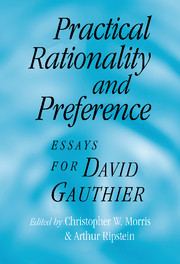Book contents
- Frontmatter
- Contents
- List of Contributors
- Practical Reason and Preference
- What Do Expressions of Preference Express?
- Preference
- Rational Temptation
- Bombs and Coconuts, or Rational Irrationality
- Are Intentions Reasons? And How Should We Cope with Incommensurable Values?
- Two Forms of Practical Generality
- Psychology for Cooperators
- Which Games Should Constrained Maximizers Play?
- The Strategy of Cooperation
- We Were Never in Paradise
Are Intentions Reasons? And How Should We Cope with Incommensurable Values?
Published online by Cambridge University Press: 11 January 2010
- Frontmatter
- Contents
- List of Contributors
- Practical Reason and Preference
- What Do Expressions of Preference Express?
- Preference
- Rational Temptation
- Bombs and Coconuts, or Rational Irrationality
- Are Intentions Reasons? And How Should We Cope with Incommensurable Values?
- Two Forms of Practical Generality
- Psychology for Cooperators
- Which Games Should Constrained Maximizers Play?
- The Strategy of Cooperation
- We Were Never in Paradise
Summary
Introduction
If you intend to do something, does your intention constitute a reason for you to do that thing? To put the question briefly: Are intentions reasons? Many philosophers have argued they are, but in this essay I shall argue they are not.
First thoughts are on my side. The view that intentions are reasons is implausible. If you have no reason to do something, it is implausible that you can give yourself a reason just by forming the intention of doing it. How could you create a reason for yourself out of nothing? Suppose, say, that you have no reason either for or against doing some act, and you happen to decide to do it. Now you intend to do it. So now, if intentions are reasons, you have a reason to do it. Since you have no contrary reason not to do it, the balance of reasons is in favour of your doing it. You now actually ought to do it, therefore. But this is implausible. It is implausible that just deciding to do something can make it the case that you ought to do it, when previously that was not the case.
I shall call this ‘the bootstrapping objection’, in honour of Michael Bratman, who raises it in his Intention, Plans, and Practical Reason. The objection is that you cannot bootstrap a reason into existence from nowhere, just by a forming an intention.
Take an example. Suppose you are wondering whether or not to visit Paris, but have not yet made up your mind.
- Type
- Chapter
- Information
- Practical Rationality and PreferenceEssays for David Gauthier, pp. 98 - 120Publisher: Cambridge University PressPrint publication year: 2001
- 78
- Cited by



